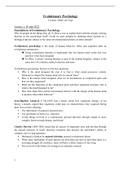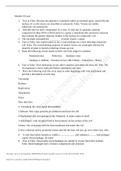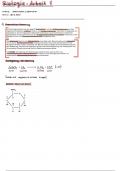College aantekeningen
Uitgebreide College Aantekeningen Evolutionary Psychology
- Instelling
- Vrije Universiteit Amsterdam (VU)
Uitgebreide college aantekeningen van het vak Evolutionary Psychology (2022/2023) in het Engels geschreven. Er wordt gebruik gemaakt van voorbeelden en referenties naar de verplichte literatuur.
[Meer zien]







